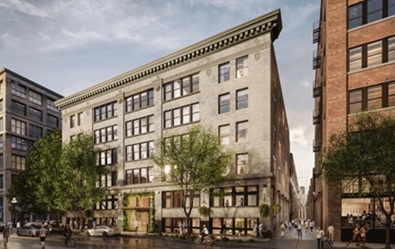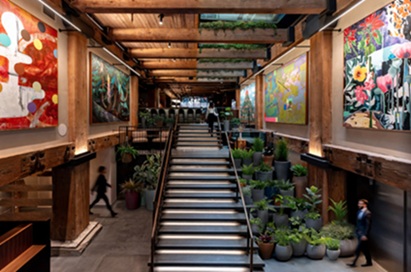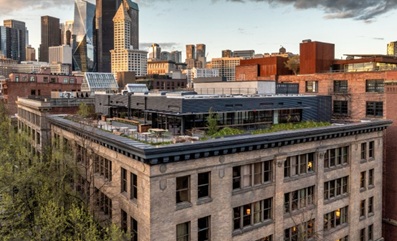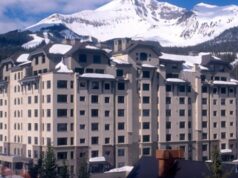 SEATTLE—Populus Hotels, a collection of carbon positive hotels that celebrate and protect the natural world, announced that Populus Seattle has secured two thousand tons of certified carbon credits as a part of its evolving, nature-based sustainability strategy. The certified carbon credits serve to offset the property’s embodied carbon footprint, equating to 1,630 mTCO2e*, making Populus Seattle the second carbon positive hotel in the country by its opening on May 22, 2025, in the city’s storied Pioneer Square.
SEATTLE—Populus Hotels, a collection of carbon positive hotels that celebrate and protect the natural world, announced that Populus Seattle has secured two thousand tons of certified carbon credits as a part of its evolving, nature-based sustainability strategy. The certified carbon credits serve to offset the property’s embodied carbon footprint, equating to 1,630 mTCO2e*, making Populus Seattle the second carbon positive hotel in the country by its opening on May 22, 2025, in the city’s storied Pioneer Square.
For this latest initiative, Populus Seattle worked with King County’s Forest Carbon Program to acquire high integrity, Verra certified forest carbon credits from King County-based projects whose core impacts include supporting land conservation, new parks, and greenspaces. It is one of many solutions that comprise Populus Seattle’s multi-faceted, nature-based approach to sustainability; other efforts, which will offset the hotel’s operational carbon footprint throughout its lifetime, include an investment in planting trees, reforestation and local silviculture, collaborating with local and regional farms to promote regenerative and organic practices, using 100 percent renewable electricity, and turning all the hotel’s food waste into compost.
Populus Seattle follows the October 2024 opening of award-winning Populus Denver, the country’s first carbon positive hotel, and will employ many of the same environmental solutions. However, whereas Populus Denver was a new build with iconic architecture by AD100 firm, Studio Gang, Populus Seattle is a historic adaptive reuse project that transforms the 1907 Westland Building into a 120-room boutique hotel, restaurant, and rooftop bar.
“We are proud to open Populus Seattle as a carbon positive hotel with a reverence for nature,” said Jon Buerge, President of Urban Villages. “The greenest building is the one that’s already built and that is true of this historic property. For Populus Seattle, adaptive reuse serves as the foundation of our evolving sustainability strategy, which includes certified forest carbon credits through King County as well as Populus Hotels’ One Night, One Tree Program that plants a tree for every night’s stay, among other nature-based solutions that take a local approach to supporting our mission of putting the health of the planet first.”
New Windows, More Natural Light
Preserving and revitalizing the historic structure reduced its carbon by 36 percent—the equivalent of 2.2 million miles driven or 492 tons of coal burned. Rather than constructing a new building or an onsite parking garage, the hotel encourages a pedestrian-friendly lifestyle and avoids additional carbon-intensive development. Design choices like adding new windows and increasing natural light help lower energy use.
Like all Populus Hotels, Populus Seattle is committed to being carbon positive—meaning it sequesters more carbon in biomass and soil than it emits through both embodied and operational activities over its full lifecycle. As the country’s second carbon positive hotel, Populus Seattle follows a rigorous Life Cycle Assessment (LCA) to evaluate the environmental impact of every material, system, and process from construction to decommissioning. The team identified opportunities to reduce embodied and operational carbon through low-impact means and methods, renewable energy, and waste reduction strategies. After every possible reduction was implemented, the property offset the remaining footprint with high-quality U.S. nature-based carbon credits to ensure a net negative carbon outcome.
 Created by Urban Villages, a leading developer and environmental steward, and brought to life in collaboration with Aparium Hotel Group, a visionary operator of independent, luxury lifestyle hotels, Populus Seattle is an adaptive reuse property that reflects the building’s 1907 history and has been thoughtfully modernized to give it a vibrant second life. With architecture by The Miller Hull Partnership and interiors by Curioso, the 120-room boutique hotel features Firn, the first and only rooftop bar in the neighborhood featuring ice-inspired cocktails and skyline views; Salt Harvest, a hearth-driven restaurant that draws inspiration from the Pacific Northwest along with The Café at Salt Harvest serving Monorail Espresso and artisan pastries; and two distinct meeting and event spaces—The Library and The Art Room.
Created by Urban Villages, a leading developer and environmental steward, and brought to life in collaboration with Aparium Hotel Group, a visionary operator of independent, luxury lifestyle hotels, Populus Seattle is an adaptive reuse property that reflects the building’s 1907 history and has been thoughtfully modernized to give it a vibrant second life. With architecture by The Miller Hull Partnership and interiors by Curioso, the 120-room boutique hotel features Firn, the first and only rooftop bar in the neighborhood featuring ice-inspired cocktails and skyline views; Salt Harvest, a hearth-driven restaurant that draws inspiration from the Pacific Northwest along with The Café at Salt Harvest serving Monorail Espresso and artisan pastries; and two distinct meeting and event spaces—The Library and The Art Room.
Populus Seattle plants a tree for every night’s stay as a part of Populus Hotels’ One Night, One Tree Program, creating a tangible and positive impact on forests in the Pacific Northwest.
Bringing Nature to the Urban Environment
Not only is Populus Seattle inspired by nature, but it also brings a diverse variety of trees and vegetation to the heart of the city through biophilia. Its lush entryway and rooftop—both designed by Seattle-based landscape architecture firm, Site Workshop—are informed by the natural ecology of Washington.
Guests are immediately immersed in nature upon stepping through the doors and into the opening vestibule, which is home to G(host) Forest, a hanging landscape art piece by Isvald Klingels composed of fallen trees, snags, logs, branches, and living plants. The old-growth trees include native Western redcedar and Yew trees, some of which are up to 500 years old and 16 feet high and pay homage to Pioneer Square’s past as a logging destination. On the rooftop, native prairie plants pay homage to the coast’s original glacial trail, while supporting biodiversity by bringing butterflies, hummingbirds, and bumblebees back into the city. Additional highlights by Seattle-based landscape designer, Camden Gardens, include a variety of tropical plants, which thrive indoors long-term, flanking the lobby’s dramatic grand staircase; an abundance of hanging greenery in Salt Harvest’s glass-wrapped Solarium; and a multi-story moss wall that runs from the lobby up through the skylight and will naturally grow moss overtime, similar to the exteriors of historic buildings found throughout Pioneer Square.
Environmentally Forward Operations & Guest Experience
All aspects of the hotel’s operations and guest experience are designed with sustainability at the forefront, without ever sacrificing comfort or style. Instead, Populus Seattle subtly invites guests to experience conscious hospitality through special touches and experiences such as a dynamic, 300 plus-piece art collection curated in partnership with the global art production house ARTXIV that features commissions from 35 local, regional and international artists and is a testament to the region’s past, present, and future as a creative epicenter. The captivating works of art were created on-site and celebrate the Pacific Northwest’s landscapes, cultural heritage, and creative pulse.
 Reverence for nature and sustainability is also seen with each design and style detail, from materials to furniture to accessories, which are consciously sourced and often repurposed to minimize waste and celebrate local character. This ranges from exposed historic brick, preserved Douglas fir beams, and local antiques given a second life, to the community table at Salt Harvest and the hospitality suite island crafted from reclaimed car decking found onsite, to Firn’s Ukidama Screen, a Japanese float wall made from salvaged buoys, and shell accessories in guestrooms, all ethically gathered from permitted beaches only after the animals had naturally vacated them.
Reverence for nature and sustainability is also seen with each design and style detail, from materials to furniture to accessories, which are consciously sourced and often repurposed to minimize waste and celebrate local character. This ranges from exposed historic brick, preserved Douglas fir beams, and local antiques given a second life, to the community table at Salt Harvest and the hospitality suite island crafted from reclaimed car decking found onsite, to Firn’s Ukidama Screen, a Japanese float wall made from salvaged buoys, and shell accessories in guestrooms, all ethically gathered from permitted beaches only after the animals had naturally vacated them.
Populus Seattle has committed to 100 percent renewable electricity through Seattle City Light’s “Green Up” program, which provides the hotel with Renewable Energy Certificates equivalent to 100 percent renewable electricity and has enrolled in PSE’s Renewable Natural Gas Program.
The building is also seeking LEED Gold certification.
Populus Seattle is located in the heart of the RailSpur micro-district in Pioneer Square, a cultural hub where art, music, history, culinary, and community converge. Developed by Urban Villages, RailSpur comprises three historic buildings and the alleyways that run through them, which regularly host community programming and events.
‘Table to Farm’ Dining: a Circular Solution for Food Waste
Populus Seattle’s restaurant and bar, Salt Harvest and Firn, will add to its environmentally forward ethos through responsibly sourced, zero waste dining. While distinct concepts, both restaurants feature nature-based, farm to table-style menus featuring fresh seasonal produce complemented by regionally sourced proteins. The restaurants will then turn 100 percent of food waste into compost. To achieve this, starting this summer, Populus Seattle will be the first hotel in Seattle to use unique “Food Cycling” technology from BioGreen360, a leading innovator in distributed food waste management solutions, which diverts 100 percent of food waste away from landfills and into all-natural compost and generates real-time data to track and report the total amount of food diversion. All food waste will be inserted into BioGreen360’s waterless, continual feed aerobic digesting system that uses microbial formulae and patent-pending mechanical and evaporation technologies to repurpose waste into an array of compost and fertilizer products that will then be distributed to local farms in Washington.
To learn more, visit www.PopulusSeattle.com.







